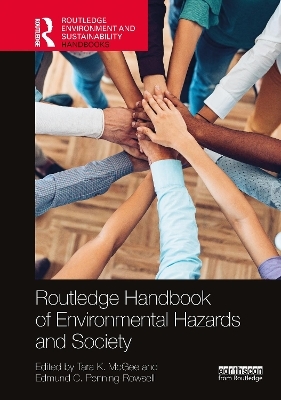
Routledge Handbook of Environmental Hazards and Society
Routledge (Verlag)
978-0-367-42714-6 (ISBN)
This Handbook provides a state-of-the-science review of research and practice in the human dimensions of hazards field.
The Routledge Handbook of Environmental Hazards and Society reviews and assesses existing knowledge and explores future research priorities in this growing field. It showcases the work of international experts, including established researchers, future stars in the field, and practitioners. Organised into four parts, all chapters have an international focus, and many include case studies from around the world. Part I explains geophysical and hydro-meteorological/climatological hazards, their impacts, and mitigation. Part II explores vulnerability, resilience, and equity. Part III explores preparedness, responses during environmental hazard events, impacts, and the recovery process. Part IV explores policy and practice, including governments, support provided during and after environmental hazard events, and provision of information.
This Handbook will serve as an important resource for students, academics, practitioners, and policymakers working in the fields of environmental hazards and disaster risk reduction.
Tara K. McGee is an interdisciplinary social scientist in the Department of Earth and Atmospheric Sciences at the University of Alberta, Canada. Her research focuses on the human dimensions of wildfires. Edmund C. Penning-Rowsell is a geographer who founded the Flood Hazard Research Centre at Middlesex University, London. He is currently the Pro Vice-Chancellor (Research) at Middlesex University. He is the editor of the international journal Environmental Hazards published by Taylor & Francis.
Table of Contents
1 Introduction: Environmental Hazards today and tomorrow
Tara K. McGee and Edmund C. Penning-Rowsell
Part 1: Environmental Hazards
Geophysical hazards
2 Earthquakes and Tsunami
Julia S. Becker, Sara K. McBride, Lauren J. Vinnell, Wendy S.A. Saunders, Graham S. Leonard, Timothy J. Sullivan and Ken Gledhill
3 Volcanic Eruption
David K. Chester and Angus M. Duncan
4 Landslides
Irasema Alcántara-Ayala and Marten Geertsema
Hydro-meteorological /climatological hazards
5 Tropical cyclones: Experiences from Bangladesh and the USA
Edris Alam and Bill DelGrosso
6 Flooding
Edmund C. Penning-Rowsell, Sally M. Priest and Lydia Cumiskey
7 Drought: The case of South Africa
Andries Jordaan
8 Extreme Heat and Cold
Michael J. Allen and Daniel J. Vecellio
9 Wildfire
Tara K. McGee, Elise Gatti and Amy Cardinal Christianson
10 Climate Change: Mitigation and Adaptation
Jörn Birkmann and Hannes Lauer
Part 2: Vulnerability, Resilience, and Equity
Vulnerability and Resilience
11 Social Vulnerability and Resilience to Environmental Hazards
Kathleen Tierney
12 Vulnerability: Its discursive and material nature
Janki Andharia
13 Community Level Social Capital and Resilience
Daniel P. Aldrich and Michelle A. Meyer
14 Urban and rural interdependencies: infrastructure services
Alexander Fekete, Asad Asadzadeh, Diana Contreras, Johannes Hamhaber, Simone
Sandholz and Dominic Sett
15 Critical Infrastructure and Hazards: A risk modelling approach
Elco Koks
Equity
16 Environmental Justice and Hazards: Case studies from the USA and India
Jayajit Chakraborty and Pratyusha Basu
17 Sexual and Gender Minorities in Disasters
Dale Dominey-Howes, Scott McKinnon, Andrew Gorman-Murray, Christine Eriksen
18 Indigenous Responses to Environmental Hazard Events
Suzanne Phibbs and Christine Kenney
Part 3: Preparedness, Responses, Impacts, and Recovery
Adaptation and preparedness
19 Adaptation to flood risk by households and small businesses
Tim Harries
20 Disaster Preparedness and Risk Reduction: An Asian Perspective
Rajib Shaw, Bismark adu-gyamfi, Vibhas Sukhwani
21 Emergency Alerting and Warnings
Jeannette Sutton and Michael M. Wood
Responses
22 Evacuation versus shelter-in-place
Jim McLennan, Chris Bearman and Barbara Ryan
23 Volunteers and community participation
Blythe McLennan
24 Religious institutions, communities and disasters
Abdur R. Cheema
Impacts
25 Physical health consequences of disasters
Penelope Burns and Gerard FitzGerard
26 Disasters and Mental Health
Michael J. Zakour
27 The economic impacts of flood risk reduction
Edmund C. Penning-Rowsell
Recovery
28 Disaster Recovery
Bimal K. Paul
29 Regenerating Socio-Cultural Capacities and Capabilities in Disaster Recovery
Douglas Paton, Petra Buergelt, Rey-Sheng Her, Li-ju Jang, Rei-Ling Lai, Ya-Lan Tseng, Ruei-Siang Wu and Sault Sagala
Part 4: Policy and Practice
Governments
30 International agreements and policies
Lidia Mayner and Virginia Murray
31 Governance issues with environmental hazards
Livhuwani Nemakonde, Sizwile Khoza and Dewald Van Niekerk
32 Local Governments and Environmental Hazards
Kristin Taylor and Stephanie Zarb
Support
33 Humanitarian Organizations and Aid
Tammam Aloudat
34 The role of Insurance in Reducing Losses from Disasters
Wouter Botzen and Howard Kunreuther
35 Settlement and Shelter Reconstruction
Erin P. O’Connell and Brent Doberstein
Information
36 Disaster Risk Reduction Education
Glenn Fernandez
37 News Media Coverage of Environmental Hazards
Bruno Takahashi
38 Reflections
Edmund C. Penning-Rowsell and Tara K. McGee
Index
| Erscheinungsdatum | 13.06.2022 |
|---|---|
| Reihe/Serie | Routledge Environment and Sustainability Handbooks |
| Zusatzinfo | 19 Tables, black and white; 44 Line drawings, black and white; 22 Halftones, black and white; 66 Illustrations, black and white |
| Verlagsort | London |
| Sprache | englisch |
| Maße | 174 x 246 mm |
| Gewicht | 1300 g |
| Themenwelt | Naturwissenschaften ► Biologie ► Ökologie / Naturschutz |
| Naturwissenschaften ► Geowissenschaften ► Geologie | |
| Naturwissenschaften ► Geowissenschaften ► Geophysik | |
| Technik ► Umwelttechnik / Biotechnologie | |
| Wirtschaft ► Betriebswirtschaft / Management ► Unternehmensführung / Management | |
| Wirtschaft ► Volkswirtschaftslehre | |
| ISBN-10 | 0-367-42714-1 / 0367427141 |
| ISBN-13 | 978-0-367-42714-6 / 9780367427146 |
| Zustand | Neuware |
| Haben Sie eine Frage zum Produkt? |
aus dem Bereich


